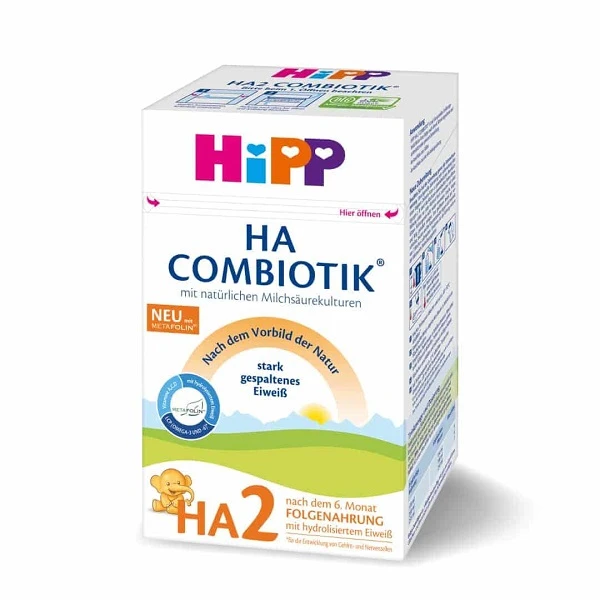With more parents being conscious of the contents of their baby\'s food, organic formulas have become increasingly popular. During the past decade, specialists have developed an impressive range of organic formulas designed to meet all of a baby\'s nutritional needs and contain all-natural ingredients. From soy and goat milk-based formulas to hypoallergenic and lactose-free options, there is a type that can suit the needs of almost any baby. Organic formulas often contain essential vitamins and minerals such as calcium, iron, and magnesium, ensuring that a baby receives the nutrition it requires for optimal growth. Parents should discuss their baby’s specific nutrition needs with their doctor in order to choose the formula that will provide just what they need.
What is infant formula?
Infant formula is a manufactured food designed to provide nutrition for infants up to 12 months or older and is usually intended as a replacement for breast milk when the mother is unable to feed her baby. Infant formulas are generally composed of cow’s milk, soy milk, or goat milk with added vitamins and minerals. For those allergic to cow’s milk or soy, there are special formulas made without these ingredients. Most infant formulas also contain lactose or some other form of sugar as a carbohydrate source.
Organic vs Non-Organic Formulas
Organic formulas are those that meet organic standards set by the US Department of Agriculture (USDA). These formulas are composed of ingredients that have been grown without the use of chemical pesticides, herbicides, and fertilizers. In addition, organic formulas contain no antibiotics or growth hormones and must be tested to ensure they meet USDA standards. Non-organic formulas may contain some synthetic ingredients such as DHA (docosahexaenoic acid), which is an omega-3 fatty acid needed for brain development, and ARA (arachidonic acid), an omega-6 fat that helps with cell growth.
Here are some examples of the best formula for your baby:
HOLLE ORGANIC INFANT FOLLOW-ON FORMULA STAGE 2
Holle Organic Stage 2 is a great organic baby formula for 6+ month infants, making it the perfect choice for parents who want to provide their children with essential nutrients without any of the worries that come with artificial preservatives and chemicals. This non-GMO, gluten-free, hormone and antibiotic-free formula offers prebiotics that includes lactic acid cultures originally obtained from breast milk and zero added sugars, artificial preservatives, chemicals, flavors, or colorings. The organic skim milk used to make this formula comes from German farms that abide by the highest European organic standards and contains brain-healthy fatty acids DHA and ARA. Parents can trust Holle Organic Stage 2 to be both safe and nutritious for their growing baby.
HIPP HYPOALLERGENIC (HA) STAGE 2 INFANT MILK FORMULA
HiPP Hypoallergenic (HA) Stage 2 organic infant milk formula is designed specifically for babies who may have difficulty tolerating standard formulas due to cow\'s milk sensitivities. This organic baby formula is made from organic cow\'s milk, with the proteins broken down to reduce allergic reactions, giving your baby all the nutritional value of organic formula without any of the risks of reactions. HiPP HA Stage 2 also comes without any added sweeteners, corn syrup, maltodextrin, or soy - helping further ensure that all they get is the healthiest and happiest nutrition available! Plus, all the organic cow\'s milk used in HiPP HA Stage 2 is sourced from pastured cows on organic farms in Germany - offering parents even more peace of mind when it comes to what goes into their babies\' bellies.
The comparison between the two formulas.
Both Holle Organic Stage 2 and HiPP Hypoallergenic (HA) Stage 2 are excellent organic baby formulas that are designed to provide babies with essential nutrients without the worry of artificial preservatives and chemicals. Both formulas have similar qualities such as prebiotics, and brain-healthy fatty acids DHA and ARA, and are free of added sugars, artificial preservatives, colors, or flavors.
However, the key difference between them is that HiPP Hypoallergenic (HA) Stage 2 formula is specifically designed for babies who may have difficulty tolerating standard formulas due to cow\'s milk sensitivities. The proteins in HiPP HA Stage 2 are broken down to reduce allergic reactions, and it also does not include sweeteners, corn syrup, maltodextrin, or soy. In comparison, Holle Organic Stage 2 is suitable for all babies 6+ months old.
What\'s in baby formula?
Most baby formulas are typically composed of a combination of vegetable oils, carbohydrates (such as lactose, corn syrup solids, or maltodextrin), proteins (often derived from cow’s milk or soy), vitamins, and minerals. Organic formulas must meet strict standards set by the US Department of Agriculture (USDA) and must be free of synthetic preservatives, flavors, and colors. Non-organic formulas may contain some synthetic ingredients such as DHA (docosahexaenoic acid), which is an omega-3 fatty acid needed for brain development, and ARA (arachidonic acid), an omega-6 fat that helps with cell growth.
Facts about the organic formula
Organic baby formula is made from ingredients that are certified organic by the USDA, including organic cow’s milk and vegetable oils. These formulas are free of synthetic chemicals and preservatives and are generally more expensive than regular formulas. Organic formulas may also include probiotics, prebiotics, DHA, ARA, or other beneficial ingredients. Parents who choose organic formula should make sure to check the labels, as some brands may contain added sugars or sweeteners.
Added information
When considering which formula is right for your baby, it\'s important to remember that all formulas must meet the same standards of nutrition and safety set by the Food and Drug Administration (FDA). Talk to your pediatrician about any questions or concerns you may have when selecting a formula for your little one. Additionally, if your baby has an allergy or sensitivity to dairy, then it is important to speak with your pediatrician before selecting an infant formula.

The Takeaway
When choosing the right baby formula for your infant, it\'s important to consider both organic and regular options. Holle Organic Stage 2 is suitable for all babies 6+ months old, while HiPP Hypoallergenic (HA) Stage 2 is specifically designed for babies who may have difficulty tolerating standard formulas due to cow\'s milk sensitivities. Be sure to check the labels for added sugars or sweeteners, and always talk to your pediatrician before selecting a formula for your baby. With the right formula, you can help ensure that your little one is receiving the nutrition they need!


